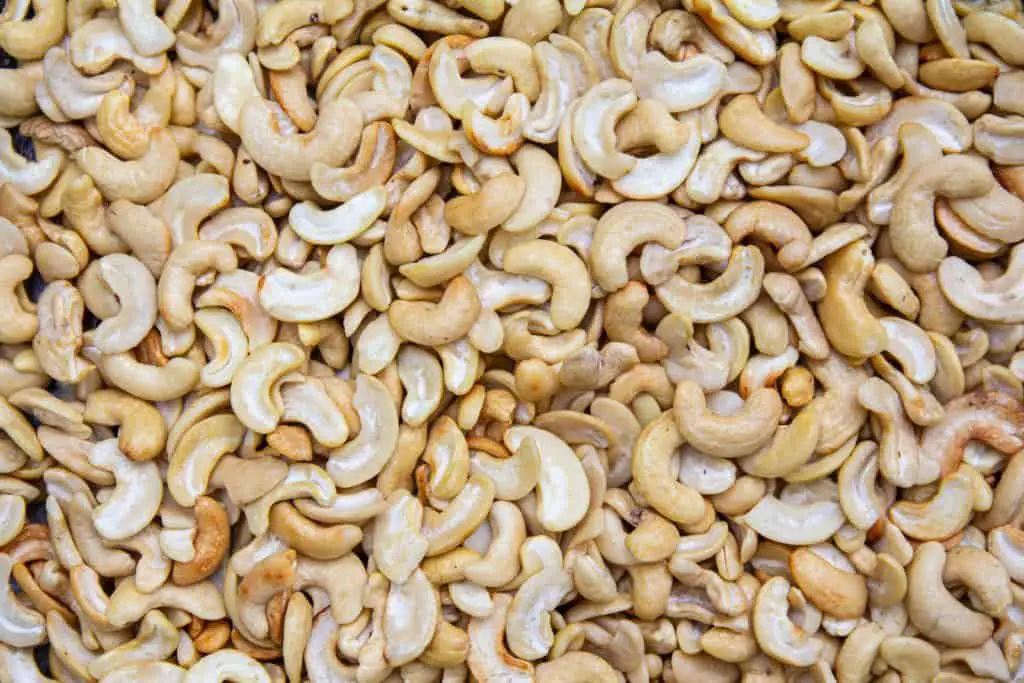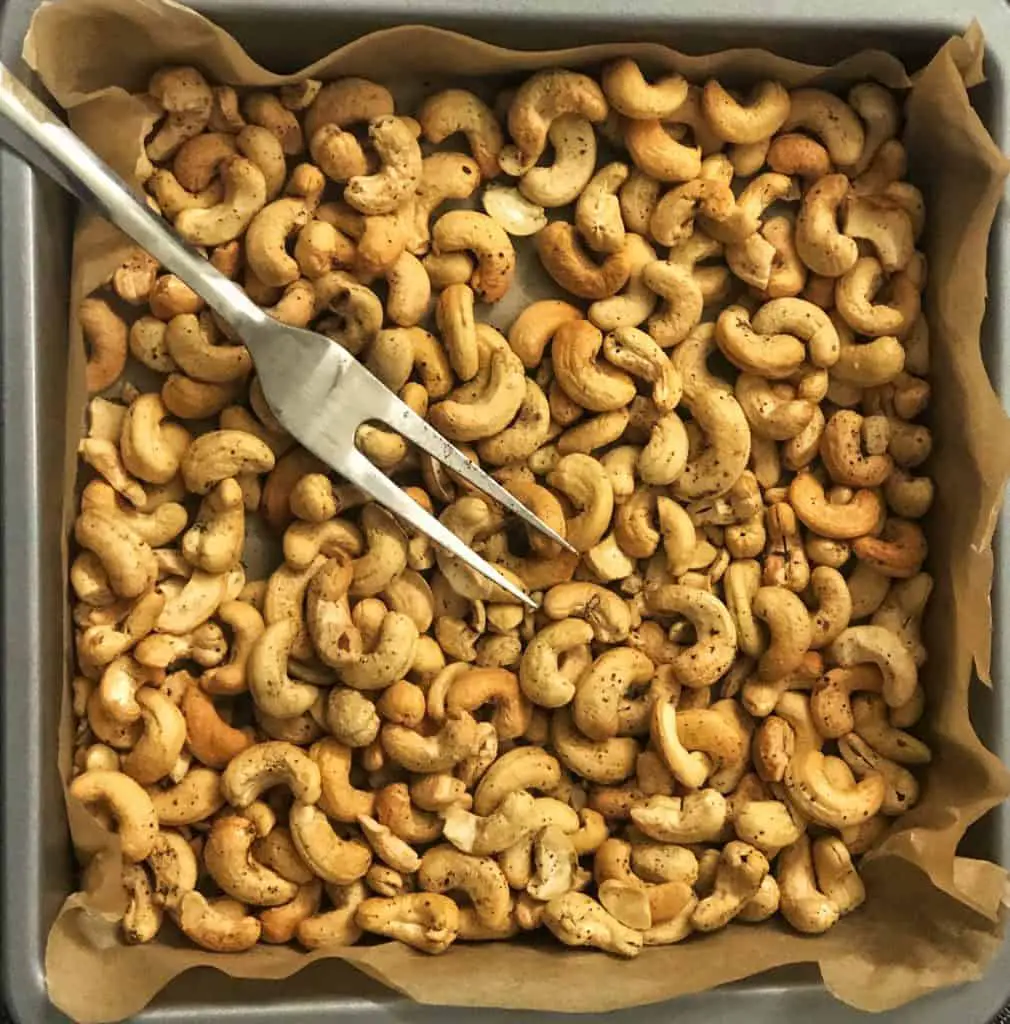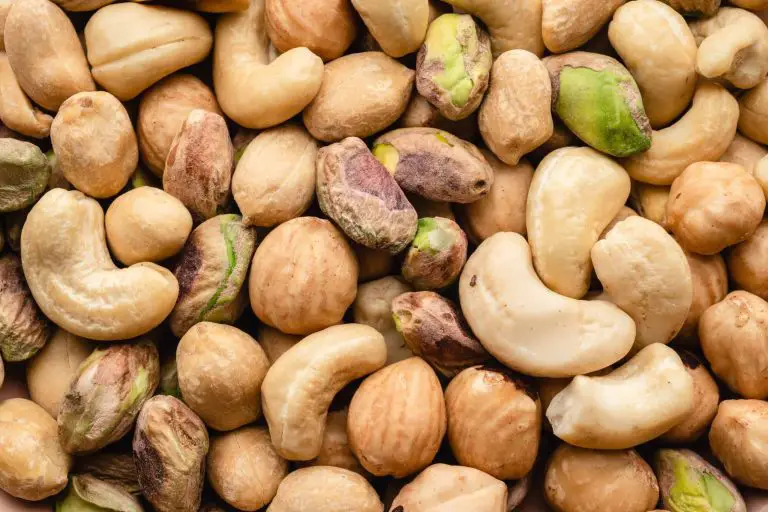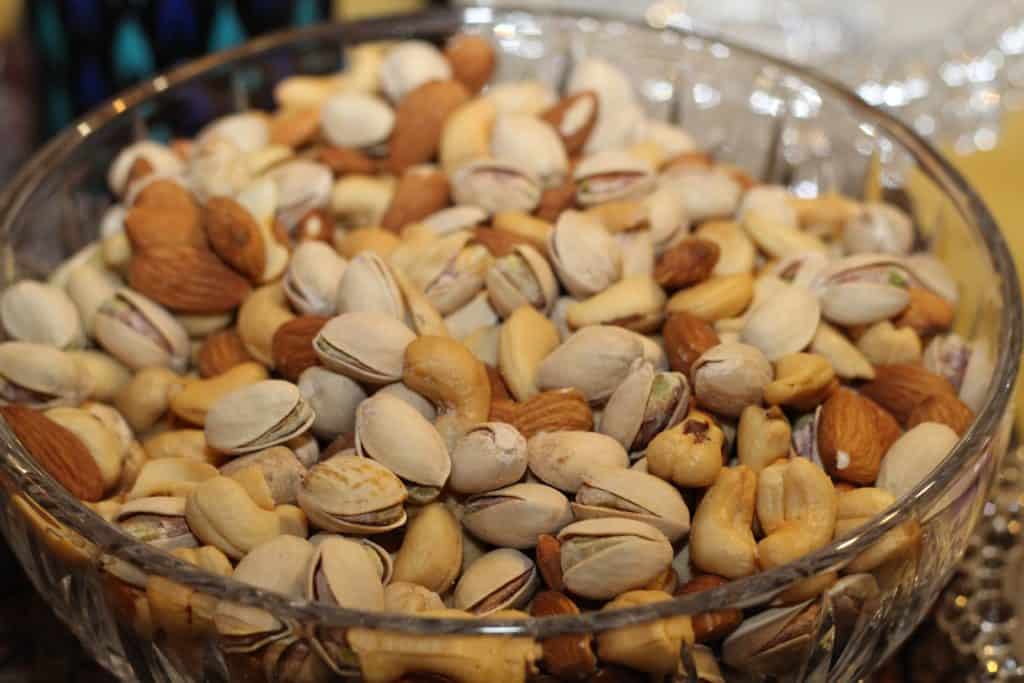Cashews are a healthy snack for humans. These buttery and sweet tree nuts pack a great nutrient punch. Humans add them to their diet because they promote brain, heart, and bone health. Not all tree nuts are toxic for dogs to consume. Are cashews bad for dogs?
Excellent question to ask before offering this tasty tree nut to your dog. Cashews are not toxic for a dog to eat. Plain cashews have health benefits for dogs, however there are many dangers with feeding this tree nut as well.
Are cashews bad for dogs? They can be beneficial for some dogs and not the best choice for others. When it comes to cashews, know how to be cautious and feed your dog sparingly.
In this article, Are Cashews Bad for Dogs, you will learn about the nutritional value of cashews for dogs, how many cashews are safe for your dog, and the potential dangers of cashews and canines.
- The Unique Cashew Nut
- Nutrients Density of Cashews for Canines
- Dangers of Feeding Cashews to Dogs
- Dogs that like Cashews
- Cashew Milk & Butter
- Alternatives to Cashews
A canine’s diet and digestion are different than a human. While canines can eat similar foods it is not likely they can eat the same quantity. When it comes to tree nuts, a few are toxic to dogs like macadamia nuts and walnuts.
Are Cashews Bad for Dogs? – The Unique Cashew Nut
This may seem like a strange question, but it could be important information when you are considering sharing a cashew with your pooch. Cashews are commonly considered a tree nut.
However, they are actually from the drupe or stone fruit family. The cashews are the “seed” or drupe of the fruit. The fruit or “shell” of the cashew is filled with a fluid that is toxic to humans and canines. It is drained and the cashew is heat treated. All raw cashews have been heat treated to destroy any remaining toxic fluid.
The cashews that are found at the markets have been harvested and heat treated to make a safe edible snack.
Most consumers know cashews for their buttery taste and nutrient density; this is one reason dogs owners like to share a few morsels with their dogs.
Related Articles:
- How to Cook Liver for Dogs
- How to Get a Picky Dog to Eat
- A Review Of The Top 5 Best Salmon Oils for Dogs
Nutrient Density of Cashews for Canines
Cashews are naturally rich in flavor and nutrition. They are a low sugar, high fiber food. How does your dog benefit?
Health Benefits of Plain Cashews
One benefit of eating cashews is the high protein content. One ounce of cashews packs five grams of protein. Plant protein that is found in cashews is easier to digest and metabolize.
- Fiber content aids in regular elimination.
- Healthy monounsaturated fats which aid in mineral absorption and give dogs healthy coats and skin.
- Iron is an important mineral that supports healthy cells and gives your dog energy.
- Zinc is crucial for immune system function and thyroid function in dogs.
- Magnesium supports energy production and aids in ligament and bone maintenance.
- Phosphorus supports healthy bones, reduces brain aging, and encourages healing.
- Antioxidants slow down the aging process and contain anti-inflammatory properties.
- Copper an essential mineral for making red blood cells and aiding the body in absorbing iron.
Dogs will not have their nutritional needs met by eating one to two cashews, however, there are certainly many benefits packed into these little tree nuts.
Related Articles:

Are Cashews Bad for Dogs? Dangers of Feeding Cashews to Dogs
Now to truly answer, are cashews bad for dogs? It is best when dog owners know the possible dangers of their dog eating cashews before sharing one with their dog.
Dog owners can be knowledgeable about the dangers of feeding cashews to their dog and make an educated decision based on their specific dog.
High Fat Content. Cashews contain too much fat for dogs that are overweight or struggle with keeping a healthy weight. A diet high in too much fat can lead to pancreatitis for dogs. Signs and symptoms of pancreatitis are decreased appetite, low energy, fever, vomiting, and diarrhea.
No Mixed Nuts. Cashews are often sold in mixes that contain other nuts. Macadamia nuts, walnuts, and pecans can cause serious health issues for dogs. Nut mixes often contain unhealthy oils, salt, and seasonings that not suitable for a dog to consume.
Choking Hazard and Intestinal Obstruction. Small dogs and large dogs that do not chew their food could choke on a cashew. Some dogs will experience intestinal obstructions from eating cashews. Symptoms of distress include gas, bloating, lethargy, overall discomfort, diarrhea, and/or vomiting.
Salt Toxicity. It is common to find cashews loaded with salt (and seasoning). It does not take much salt consumption for a dog to see negative repercussions. Dogs can experience dehydration, gastrointestinal issues, and salt toxicity. Signs and symptoms include vomiting, diarrhea, tremors and/or seizures.
Related Articles:
- Ultimate Guide: How To Take Care Of A Puppy
- Ultimate Guide: How To Take Care Of A Dog
- Ultimate Guide: How To Take Care Of A Senior Dog
- The Benefits of Owning a Dog
- Top 12 Tips for First Time Dog Owners
Tree Nut Allergies. Dogs can have allergic reactions to tree nuts, just like humans. The signs and symptoms include facial swelling, hives, itchiness, rashes, itchy ears, and licking their paws.
Bladder Stones. Too many cashews can lead to too much phosphorus for your dog. While phosphorus is essential for healthy bones and reducing aging it can also cause problems for dogs. The phosphorus in cashews can harden in the dog’s bladder leading to the formation of bladder stones.
Potential to Harbor Mold. Even though cashews are considered a low-mold nut, they can contain a specific mold called Aspergilla mold. Dogs can be sensitive to the aflatoxin produced by this mold.
Symptoms could include jaundice, lethargy, liver failure, and lack of appetite. Dogs that have a weaker immune system could be affected more by ingesting this type of mold. If you suspect your dog has ingested this mold, you will want to see your local veterinarian.
Call your veterinarian if your dog is experiencing any of the above symptoms from choking hazards, obstructions, salt toxicity, mold toxicity, or a potential allergic reaction to tree nuts.
Related Articles:
- A Review of the 5 Best Peanut Butters for Dogs
- A Review of the 5 Best High Fiber Dog Foods For Anal Gland Problems
- How to Get a Dog To Take a Pill

Dogs that like Cashews
Are cashews bad for dogs? In small amounts, some dogs can eat plain cashews. After sharing a cashew with your dog, you might discover they find it a delightful snack! Use caution when sharing a cashew with your dog.
- Keep all snacks and treats to less than 10% of your dog’s diet.
- Cashews are a high calorie food with 10 calories per nut. One cashew is a sweet treat!
- No cashews from variety packs or mixed nut containers. Bring home plain raw or roasted cashews that are free of seasonings and salt.
- Inspect the tree nut for any signs of mold.
- It is rare to see cashews sold attached to the fruit or “shell”. If you encounter it in this form, avoid giving your dog unshelled cashews, that have yet to be heat treated.
What if your dog helped themselves to your bag of cashews?
Monitor Your Dog. Watch your dog carefully after they cashews. Look for signs of distress, discomfort, gagging, or bloating.
Know the Signs of Allergic Reaction. Call for veterinarian advice if you suspect your dog is having an allergic reaction.
Changes in Appetite. If your dog has a potential obstruction, they might not be interested in mealtimes.
Check Stool. Make sure your dog has normal elimination. If you notice any blood in the stool, call your veterinarian for advice.
What About Cashew Butter & Cashew Milk?
Alternatives to dairy products are a must for those with an allergic reaction to cow’ milk. Cashew milk is sold in stores as an alternative to milk. It is also used as the base for dairy free ice cream.
Keep it simple when sharing cashew milk with your pooch. Cashew milk made with water and raw cashews is fine for your dog to have a nibble or lick. As always, purified water is the best choice for your dog to drink.
Can dogs eat cashews in the form of butter? Cashew butter is often consumed by people that have a peanut allergy. Dogs could eat cashew butter if it is mixed only with its own oil. Cashew butter that has added oils, sweeteners and salt make it off limits to your dog.
Alternatives to Cashews
A safer alternative food, that is of similar texture to cashew butter, and found delicious by dogs is peanut butter. Peanuts are a legume and not a tree nut. Most dogs have an easier time digesting peanut butter.
When buying peanut butter that you can share with your dog, look for brands that contain only “peanuts”. Dogs do not need added refined sugars or added salt. One sweetener that can be deadly to your dog is xylitol. You will be safe giving your dog simple peanut butter in moderation.

Are Cashews Bad for Dogs?
Cashews are neither great or terrible for canines to eat. This little sweet nut does have many nutritional benefits to both humans and their dogs. It is fine, for most dogs, to have a cashew treat.
Keep it simple with plain or raw cashews and limit it to one for small to medium dogs. Large dogs could tolerate two cashews as a special treat. As always, monitor your dog for any signs of distress after introducing them to a new food.
Please read our Legal Disclaimer


